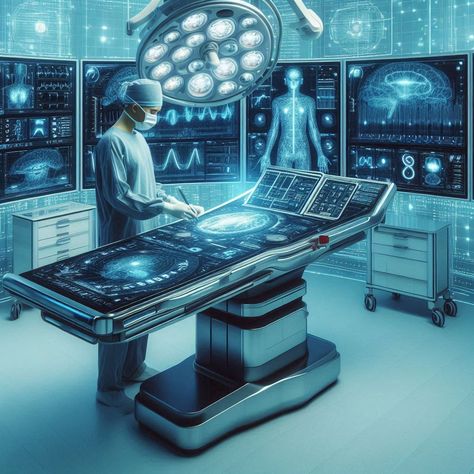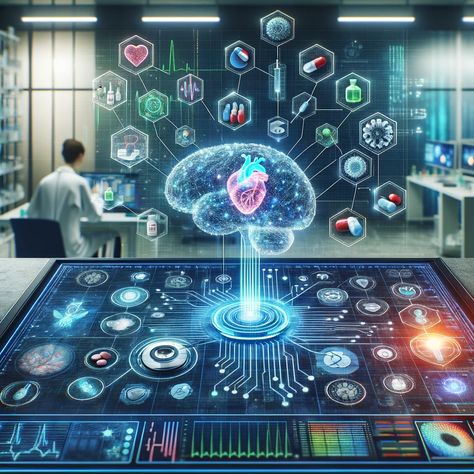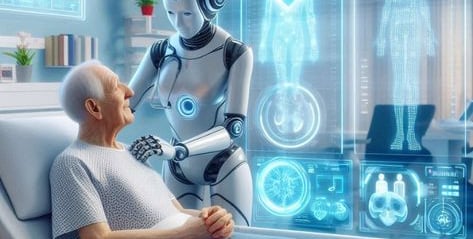AI in Healthcare: Benefits, Challenges & Future Trends
Discover how Artificial Intelligence (AI) is revolutionizing the healthcare industry in 2025. From improving diagnostics and personalized treatments to streamlining hospital operations and predicting disease outbreaks, AI is transforming patient care and medical research. In this post, we explore the top applications of AI in healthcare, real-world examples, benefits, challenges, and what the future holds for this powerful technology. Whether you're a healthcare professional, tech enthusiast, or curious reader, this guide will provide valuable insights into the growing role of AI in the health sector.


AI in Healthcare: Benefits, Challenges & Future Trends
Introduction
Artificial Intelligence (AI) is rewriting the rules of healthcare, turning what was once science fiction into reality. In 2025, AI is at the heart of medical innovation, driving breakthroughs that make care more precise, accessible, and personalized. From predicting diseases before they strike to guiding surgeons with robotic precision, the impact of artificial intelligence on modern healthcare is transformative. This blog takes a deep dive into how AI is reshaping the industry, exploring its key applications, benefits, challenges, and real-world success stories. Whether you’re a patient curious about your future doctor’s visit, a healthcare professional navigating new tech, or a tech enthusiast marveling at AI’s potential, this post offers a comprehensive look at how artificial intelligence is revolutionizing medicine—and why it matters to all of us.
How AI is Transforming Healthcare
Predictive Analytics: Preventing Illness Before It Starts
Imagine a world where your doctor knows you’re at risk for a stroke months before you feel a single symptom. That’s the power of predictive analytics, one of AI’s most game-changing contributions to healthcare. AI algorithms analyze vast datasets—electronic health records, genetic profiles, wearable device data, and even social determinants like lifestyle habits—to spot early warning signs of conditions like diabetes, cancer, or heart disease. In 2025, these tools are standard in many hospitals, enabling proactive care that saves lives and cuts costs.
For example, Stanford Medicine has used AI to predict sepsis in ICU patients hours before it becomes life-threatening, allowing timely interventions. Predictive analytics also powers public health efforts, like forecasting flu outbreaks based on search trends or social media chatter. By shifting the focus from treating illness to preventing it, AI is redefining healthcare as a science of foresight.
: Treatments as Unique as Personalized Medicine You Are
No two patients are alike, so why should their treatments be? Personalized medicine is booming, thanks to AI’s ability to tailor care to individual needs. Machine learning models process your genetic makeup, medical history, and even daily habits to recommend therapies or medications with the highest likelihood of success. In oncology, AI analyzes tumor DNA to pinpoint drugs that target specific mutations, sparing patients from ineffective treatments.
In 2025, personalized medicine is more accessible than ever. Companies like Foundation Medicine use AI to guide cancer therapies, while startups are developing apps that adjust diabetes management plans based on real-time blood sugar data. This bespoke approach minimizes side effects, boosts recovery rates, and empowers patients to take charge of their health. It’s healthcare designed for you, not the average.
Robotic Surgery: A New Era of Precision
Picture a surgeon performing a delicate heart procedure with the steadiness of a machine. That’s the reality of robotic surgery, where AI enhances human skill with superhuman precision. Systems like the da Vinci Surgical System combine robotic arms, high-definition imaging, and AI algorithms to navigate complex operations. The AI tracks tissue changes in real-time, predicts complications, and adjusts for even the slightest tremors, making surgeries safer and less invasive.
In 2025, robotic surgery is expanding beyond elite hospitals. Remote surgeries, where specialists operate via AI-guided robots from thousands of miles away, are bringing expertise to underserved regions. For instance, a recent trial in India used 5G and AI to perform remote gallbladder surgeries, slashing costs and wait times. Recovery times are shorter, scars are smaller, and outcomes are better—proof that AI is cutting deeper than ever.
Advanced Diagnostics: Catching What the Eye Misses
AI is also revolutionizing diagnostics, acting like a tireless second pair of eyes for doctors. It excels at analyzing medical images—X-rays, MRIs, CT scans, and even pathology slides—often spotting issues faster and more accurately than humans. In 2025, AI tools are routine in radiology and pathology labs, detecting early signs of breast cancer, lung disease, or Alzheimer’s with remarkable precision.
A standout example is Google Health’s AI, which identifies diabetic retinopathy in eye scans with accuracy matching top specialists. Another is PathAI, which helps pathologists diagnose cancers by highlighting subtle patterns in tissue samples. These tools don’t replace doctors—they amplify their expertise, catching details that could save lives. AI diagnostics are especially vital in low-resource settings, where they bridge gaps in specialist access.
Virtual Health Assistants: Care Around the Clock
Ever wished you could ask a doctor a question at 2 a.m.? Virtual health assistants powered by AI are making that possible. These chatbots and apps, like Ada or Babylon Health, answer questions, assess symptoms, and monitor chronic conditions 24/7. In 2025, they’re smarter than ever, using natural language processing to understand nuanced queries and provide tailored advice.
For example, patients with asthma can use AI apps to track triggers and adjust inhaler use, while mental health platforms like Woebot offer cognitive behavioral therapy on demand. These tools ease the strain on healthcare systems, reduce unnecessary ER visits, and empower patients to manage their health proactively. It’s like having a nurse in your pocket—without the coffee breaks.
The Benefits of AI in Healthcare
AI’s impact goes beyond flashy tech—it delivers tangible improvements that ripple across the healthcare ecosystem:
Unmatched Accuracy: AI’s ability to detect patterns in data leads to earlier, more precise diagnoses, reducing missed or delayed treatments.
Cost Reduction: By streamlining processes, eliminating redundant tests, and preventing complications, AI saves billions annually for providers and patients.
Global Access: AI tools, especially diagnostics and virtual assistants, bring quality care to remote or underserved areas, narrowing health equity gaps.
Time Efficiency: Automating tasks like charting, billing, or image analysis frees up clinicians to focus on what matters—caring for patients.
Patient Empowerment: AI apps and wearables give people real-time insights into their health, fostering proactive habits and better outcomes.
These benefits aren’t just numbers—they translate to healthier lives and a more sustainable healthcare system.
Challenges and Ethical Considerations
AI’s potential is immense, but it’s not a magic bullet. Several hurdles must be navigated to ensure it serves everyone fairly:
Data Privacy and Security: AI relies on sensitive patient data, raising risks of breaches or misuse. In 2025, cybersecurity remains a hot-button issue, with ongoing debates about encryption and consent.
Algorithmic Bias: If AI models are trained on skewed datasets (e.g., lacking diversity), they can misdiagnose or undertreat certain groups, like women or minorities. Efforts to diversify training data are critical.
Regulatory Gaps: Governments are racing to create rules for AI’s safe use, but innovation often outpaces policy, creating gray areas around liability and accountability.
Job Displacement Fears: While AI won’t replace doctors, it could shift roles for support staff, sparking concerns about retraining and employment.
Loss of Human Touch: Overreliance on AI risks depersonalizing care, making it vital to balance tech with empathy and human connections
Real-World Success Stories
AI is already making waves in healthcare—here are a few standout examples from 2025:
IBM Watson Health: Used by oncologists to analyze research and suggest tailored cancer treatments, cutting decision-making time from weeks to hours.
Fitbit + Google AI: Wearables now predict irregular heart rhythms and alert users to seek care, credited with preventing thousands of strokes annually.
DeepMind’s AlphaFold: Originally a protein-folding breakthrough, it’s now accelerating drug discovery for diseases like Alzheimer’s, slashing research timelines.
Zebra Medical Vision: This AI platform flags abnormalities in chest X-rays, helping overworked radiologists prioritize urgent cases in busy hospitals.
Mental Health Support: Apps like Youper use AI to deliver personalized therapy, reaching millions who lack access to traditional counseling.
These stories show AI isn’t just theoretical—it’s delivering results right now.
What is the The Future of AI in Healthcare?
Looking ahead, AI’s role in healthcare is set to grow exponentially. By 2030, experts predict AI could power fully autonomous diagnostic systems, integrate seamlessly with brain-computer interfaces for neurological care, and even predict pandemics with near-perfect accuracy. Innovations like AI-driven prosthetics or real-time gene editing are on the horizon, promising to tackle previously untreatable conditions. But the future isn’t just about tech—it’s about ensuring AI remains human-centered, equitable, and aligned with the goal of healthier lives for all.
Conclusion
The impact of artificial intelligence on modern healthcare is nothing short of a revolution. Through predictive analytics, personalized medicine, robotic surgery, advanced diagnostics, and virtual assistants, AI is making care more precise, affordable, and accessible in 2025. Real-world successes—from cancer breakthroughs to mental health support—prove its value, even as challenges like privacy and bias demand careful attention. As AI evolves, it’s not just changing how we heal—it’s redefining what it means to be healthy.
source : https://www.science.org/blogs ,https://www.fda.gov/medical-devices/digital-health-center-excellence/blog-promise-artificial-intelligence-holds-improving-health-care ,https://aimi.stanford.edu/blog
# what is the impact of AI on healthcare? #AI on healthcare




